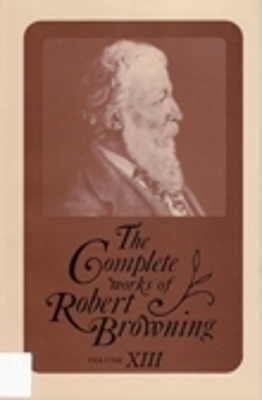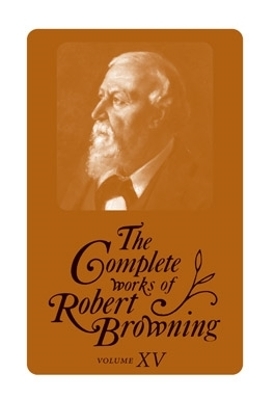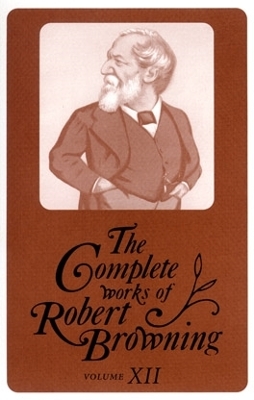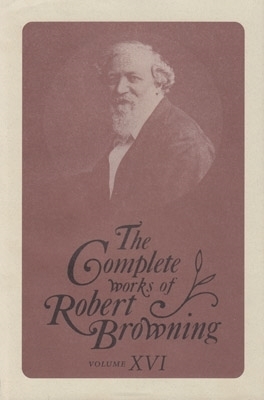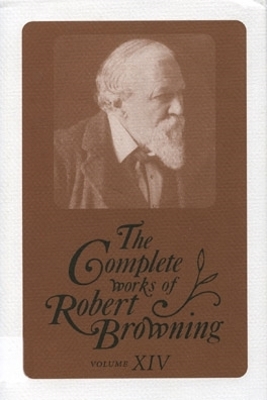The Complete Works of Robert Browning
5 total works
The present volume, the 13th in a projected 17-volume collection, contains The Inn Album (1875), a dramatic narrative involving seduction and murder, and Of Pacchiarotto and How He Worked in Distemper with Other Poems (1876), Browning's fiercely humorous attack on his critics. The texts are based on
In seventeen volumes, copublished with Baylor University, this acclaimed series features annotated texts of all of Robert Browning's known writing. The series encompasses autobiography as well as influences bearing on Browning's life and career and aspects of Victorian thought and culture.? The sixth in the projected seventeen-volume work, this volume covers the second half of Men and Women (1855), perhaps Browning's most famous collection, and the entirety of Dramatis Personae (1864), the first book Browning produced after the death of Elizabeth Barrett Browning in 1861. Men and Women II contains several great dramatic poems on which Browning's reputation still depends, including "Andrea del Sarto," "Saul," and "Cleon." It also includes the more intimate and personal works "The Guardian Angel" and "One Word More," as well as the mysterious "Women and Roses." The Brownings' shared interests in Renaissance art and nineteenth-century Italian politics inform the challenging "Old Pictures in Florence."
The publication of Dramatis Personae was a key event in the rapid rise of Browning's fame in the 1860s, though the collection is marked by a welter of conflicting impulses that arose after the poet left Italy and his married life behind. The classic monologues "Rabbi Ben Ezra" and "Abt Vogler" are here, but beside them Browning placed the nearly surreal "Caliban upon Setebos" and the achingly self-regarding "James Lee's Wife," one of the volume's handful of dramatic lyrics about betrayed or failed relationships. Also included are "A Death in the Desert," which contributed to the intense Victorian debate about scriptural validity and religious authority; and "Mr Sludge, 'The Medium,'" Browning's ferocious, pyrotechnic expose of a spiritualist fraud. As always in this acclaimed series, a complete record of textual variants is provided, as well as extensive explanatory notes.
The publication of Dramatis Personae was a key event in the rapid rise of Browning's fame in the 1860s, though the collection is marked by a welter of conflicting impulses that arose after the poet left Italy and his married life behind. The classic monologues "Rabbi Ben Ezra" and "Abt Vogler" are here, but beside them Browning placed the nearly surreal "Caliban upon Setebos" and the achingly self-regarding "James Lee's Wife," one of the volume's handful of dramatic lyrics about betrayed or failed relationships. Also included are "A Death in the Desert," which contributed to the intense Victorian debate about scriptural validity and religious authority; and "Mr Sludge, 'The Medium,'" Browning's ferocious, pyrotechnic expose of a spiritualist fraud. As always in this acclaimed series, a complete record of textual variants is provided, as well as extensive explanatory notes.
In seventeen volumes, copublished with Baylor University, this acclaimed series features annotated texts of all of Robert Browning's known writing. The series encompasses autobiography as well as influences bearing on Browning's life and career and aspects of Victorian thought and culture.? A single work, the complex Aristophanes' Apology (1875), comprises the twelfth volume of The Complete Works of Robert Browning. Second in Browning's series of long narrative poems based on classical Greek materials, Aristophanes' Apology begins as a further adventure of Browning's young Greek heroine, Balaustion (previously encountered in Balaustion's Adventure, in Volume X of the present edition). In a confrontation with Aristophanes, Balaustion defends her (and Browning's) favorite tragedian, Euripides, whom Aristophanes had repeatedly satirized. Aristophanes offers an ingenious, vigorous explanation of his motives and values, but Browning ensures that Balaustion claims the higher moral and artistic ground for Euripides. To demonstrate his greatness, she reads Euripides' play Herakles aloud, in Browning's own translation.?
Browning's understanding of this play and its author, like his view of Greek drama overall, is both idiosyncratic and strongly held. He energetically takes up artistic and philosophical issues ancient and modern through his dramatized speaker. Many interpreters have noted that the charges against Euripides are parallel to Victorian critics' complaints about Browning's own works, and that the poet's justification of Euripides constitutes a vehement defense of his art.? As always in this acclaimed series, a complete record of textual variants is provided, as well as extensive explanatory notes.
Browning's understanding of this play and its author, like his view of Greek drama overall, is both idiosyncratic and strongly held. He energetically takes up artistic and philosophical issues ancient and modern through his dramatized speaker. Many interpreters have noted that the charges against Euripides are parallel to Victorian critics' complaints about Browning's own works, and that the poet's justification of Euripides constitutes a vehement defense of his art.? As always in this acclaimed series, a complete record of textual variants is provided, as well as extensive explanatory notes.
In seventeen volumes, copublished with Baylor University, this acclaimed series features annotated texts of all of Robert Browning's known writing. The series encompasses autobiography as well as influences bearing on Browning's life and career and aspects of Victorian thought and culture.? Robert Browning wrote Parleyings with Certain People of Importance in Their Day in his seventy-third year. The work is a capstone to the poet's long career, encompassing autobiography as well as influences bearing on the poet's life and career and on Victorian thought and culture in general. One of Browning's most complex works, Parleyings is also a work essential to understanding his genius and career as a whole. The Ohio/Baylor Browning edition offers keys to the complexity and interest of Parleyings through a definitive, emended text, full annotations for allusions both explicit and implicit in the text, and variant readings for the manuscript and all editions revised by Browning during his lifetime. In form and structure, Parleyings is a series of seven poems written in Browning's own voice and addressed to figures influential in his development.
The series is framed by a prologue and an epilogue, the whole amounting to some 3,500 lines. The poems are a formal contrast and a pendant to the great series of linked dramatic monologues in The Ring and the Book. They demonstrate the zest for innovation possessed by the master of the dramatic monologue in his ripe maturity. Interested readers as well as students and scholars of Browning will find a rich field of poetry and a critical mass of resources in Volume XVI of the Ohio/Baylor Browning edition. As always in this acclaimed series, a complete record of textual variants is provided, as well as extensive explanatory notes.
The series is framed by a prologue and an epilogue, the whole amounting to some 3,500 lines. The poems are a formal contrast and a pendant to the great series of linked dramatic monologues in The Ring and the Book. They demonstrate the zest for innovation possessed by the master of the dramatic monologue in his ripe maturity. Interested readers as well as students and scholars of Browning will find a rich field of poetry and a critical mass of resources in Volume XVI of the Ohio/Baylor Browning edition. As always in this acclaimed series, a complete record of textual variants is provided, as well as extensive explanatory notes.
In seventeen volumes, copublished with Baylor University, this acclaimed series features annotated texts of all of Robert Browning's known writing. The series encompasses autobiography as well as influences bearing on Browning's life and career and aspects of Victorian thought and culture.? Volume XIV of The Complete Works of Robert Browning records a transition in the poet's career. With The Agamemnon of Aeschylus (1877), Browning ended his experiments with classical sources, creating his "transcript" not quite a translation of the Greek original and providing an intriguing explanation for his approach. La Saisiaz, the deeply personal expression of Browning's shock at the sudden death of a dear friend, was published in 1878 with The Two Poets of Croisic, an extended ironic meditation on literary fame. Browning's collection of six poems under the title Dramatic Idyls (1879) marks the poet's return to the dramatic forms he perfected in Men and Women and Dramatis Personae, and a revival of his interest in the psychology of motives. As always in this acclaimed series, a complete record of textual variants is provided, as well as extensive explanatory notes.
